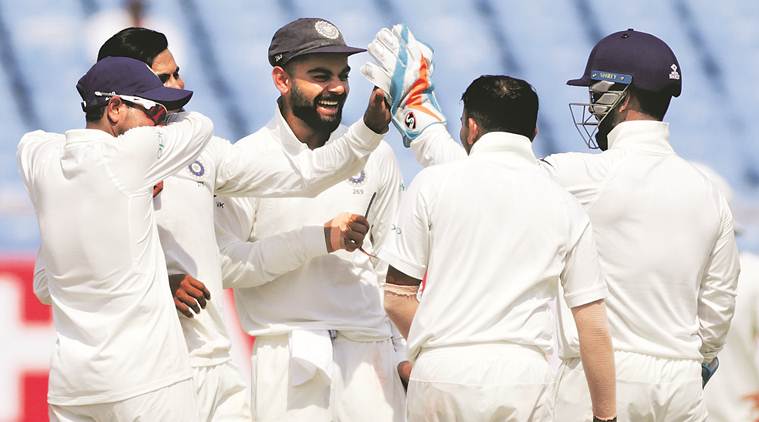- India
- International
India vs West Indies 1st Test: West Indies commit hara-kiri in Rajkot
Mindless batting plays into India’s hands; lose by an innings and 272 runs inside three days as Kohli’s side record biggest Test win.
 The Indian team after the innings and 272-run win over West Indies on Day Three of the first Test at Rajkot. (Below) Kieran Powell top-scored for West Indies with 83 in the second innings. (Source: AP)
The Indian team after the innings and 272-run win over West Indies on Day Three of the first Test at Rajkot. (Below) Kieran Powell top-scored for West Indies with 83 in the second innings. (Source: AP)
Every time an army of groundsmen streamed into the ground, brushy brooms, crease markers and clunky tins of paint clinking in their arms, during the drinks break, the West Indies batsmen would suspiciously stare at the surface. As if the cracks were drifting apart, the exploding clouds of dust were to consume them, and the surface was glaring back at them with roguish malevolence.
Their fears couldn’t have been more mislaid—the cracks were still firm, the dust whirled from the footmarks of the bowlers’ landing foot and the surface was amiably winking at them, there were a lot of runs yet to be scored. But confused minds and bewildered eyes breed fear and doubts, so much so that it was difficult to assess whether it was ineptness or indiscretion that plunged them to their worst defeat at the hands of India, by an innings and 270 runs, holding up for a notch less than 100 overs, losing 14 wickets in a day.
Those are pitiable numbers on any surface at any level, and there was much to be pitied about the West Indies, from their lack of requisite skills to misplaced methods. Methods first. When the situation demanded putting the heads down and grinding the opposition to tedium—they were still 468 runs behind India at the start of the second innings—they tried to hit their way out of hell, giving little pretence to saving the match through the time-tested modes of defiance. What ensued belonged to the lingo of tree-cutters or professional killers—hack, heave, slash—than that of Test cricketers. In the inevitable chaos, only opener Kieran Powell justified the logic of their approach, the rest wilted in the ungainliest of fashions, like upgraded lower-order batsmen. The difference between Powell and his colleagues was that the former was judicious, a distinct method flickering in his madness, a directness about the ploy. He wouldn’t rush forth to every ball, only if the spinner tossed the ball up he would shimmy down the surface, his bat swinging through straight lines. It didn’t matter whether he reached to the pitch of the ball, the strong forearms provided the impetus. As his innings progressed, he became pickier.
Proverbial kitchen sink
His partners, instead, repeatedly threw the proverbial kitchen sink at the ball, without any rhyme or reason. Shimron Hetmyer, touted the next big batting sensation in Caribbean cricket, tried a preempted slog. The delivery was fuller and the dip ensured that he top-edged to short third-man. Sunil Ambris, centurion in the warm-up game, mindlessly wandered to Kuldeep Yadav, went through with the slog and was beaten by the latter’s googly.
Even the usually composed Roston Chase tried to belt a tantalisingly flighted, wide ball off Yadav from the crease and perished. The sequence repeated over and over again with varying degrees of banality as the Windies’ plummeted to new depths.

The only grain of rationale in their full-throttle offence was it suited their temperament, a natural off-spring of their T20 evangelism; their batsmen, more often than not, flourish when they look to attack. Skipper Kraigg Brathwaite admitted as much, and revealed where they found their inspiration from: “We realised that the best way to make a comeback was to attack, like how Prithvi Shaw did. It suits our style. But unfortunately we attacked way too much.”
Attack of course, but not every ball. After all, bowling at them were two of the cleverest exponents of spin around, Ashwin and Ravindra Jadeja, besides the rapidly emerging Yadav. They are neither naive to feel flustered nor reactionary enough to get rattled after a few sixes.
Alarmingly, even when they tried to slog, sweep, slog-sweep or step down the crease, they did it unskillfully—trying to sweep fullish balls, unmindful of keeping it down, attempting to drag deliveries from outside the off-stump or wishfully trying to heave across the line.
At the heart of their risky strategy reeked a distrust in defence. Most, even Powell at times, couldn’t read the spinners off their hands, a few couldn’t decipher them off the pitch. They battled the uncertainty with wanton swing of their forearms. And it wasn’t a case of India’s spinners bowling exceptionally. Yadav wasn’t letting it rip; Jadeja wasn’t fizzing; Ashwin wasn’t tearing away his variations.
Their former coach, Otis Gibson, had identified this problem soon after they’d won the T20 World Cup. “We have a lot of great T20 players and when they play Test cricket they might score a lot of runs but the game might finish in three days. We need to get some guys who can bat for a day and a half.”
This was the day they missed someone like Shivnarine Chanderpaul, or even Jimmy Adams, someone who could blunt and blunt, tire the Indian bowlers, return to the dressing room with dirt-and-dust smeared flannels. But the tribe of Chanderpaul and Adams seem dwindling. All they are left with is a swathe of batsmen caught up in a T20-bubble, their game and sensibilities moulded by its swelling reach. By the time their batsmen left the stadium, the strip was being charred, as the groundstaff routinely do after the match. The last remains of their reputation were firmly ironed beneath.
Get latest updates on IPL 2024 from IPL Points Table to Teams, Schedule, Most Runs and Most Wickets along with live score updates for all matches. Also get Sports news and more cricket updates.










































